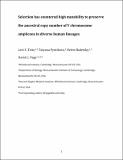Selection Has Countered High Mutability to Preserve the Ancestral Copy Number of Y Chromosome Amplicons in Diverse Human Lineages
Author(s)
Teitz, Levi Shmuel; Pyntikova, Tatyana; Skaletsky, Helen; Page, David C
DownloadAccepted version (19.32Mb)
Publisher with Creative Commons License
Publisher with Creative Commons License
Creative Commons Attribution
Terms of use
Metadata
Show full item recordAbstract
Amplicons—large, highly identical segmental duplications—are a prominent feature of mammalian Y chromosomes. Although they encode genes essential for fertility, these amplicons differ vastly between species, and little is known about the selective constraints acting on them. Here, we develop computational tools to detect amplicon copy number with unprecedented accuracy from high-throughput sequencing data. We find that one-sixth (16.9%) of 1,216 males from the 1000 Genomes Project have at least one deleted or duplicated amplicon. However, each amplicon's reference copy number is scrupulously maintained among divergent branches of the Y chromosome phylogeny, including the ancient branch A00, indicating that the reference copy number is ancestral to all modern human Y chromosomes. Using phylogenetic analyses and simulations, we demonstrate that this pattern of variation is incompatible with neutral evolution and instead displays hallmarks of mutation-selection balance. We also observe cases of amplicon rescue, in which deleted amplicons are restored through subsequent duplications. These results indicate that, contrary to the lack of constraint suggested by the differences between species, natural selection has suppressed amplicon copy number variation in diverse human lineages.
Date issued
2018-08Department
Massachusetts Institute of Technology. Department of BiologyJournal
American Journal of Human Genetics
Publisher
Elsevier BV
Citation
Teitz, Levi Shmuel et al. "Selection Has Countered High Mutability to Preserve the Ancestral Copy Number of Y Chromosome Amplicons in Diverse Human Lineages." American Journal of Human Genetics 103, 2 (August 2018): P261-275 © 2018 American Society of Human Genetics
Version: Author's final manuscript
ISSN
0002-9297